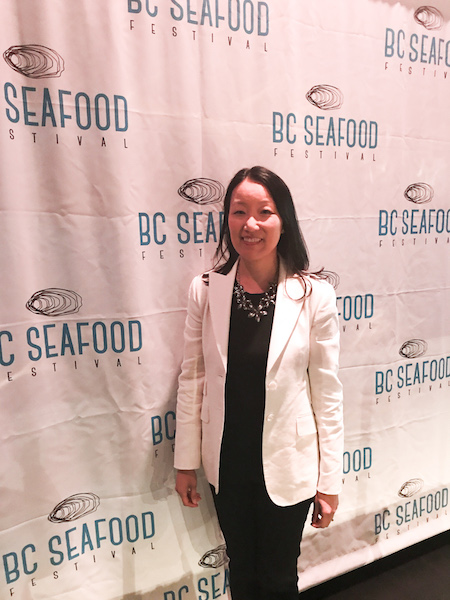Sustainable seafood, the solution for a healthier you
Farmed fish can help with the recovery of natural fish populations and provide a healthier alternative to land-based animal protein – Seafood Nutrition Partnership
By Fabian Dawson
SeaWestNews
Seafood raised through sustainable aquaculture operations can help secure food security for nations around the world and provide a solution to the health crisis facing Americans, says the Seafood Nutrition Partnership.
“All seafood, whether raised sustainably or caught responsibly can significantly improve overall health…our objective is to get people to eat more of it for their health,” Linda Cornish (pictured), president of the Seafood Nutrition Partnership, told Seawestnews, before her keynote address and panel discussion at the on-going BC Seafood Expo and Shellfish Festival on Vancouver Island.
Cornish dismissed claims that farmed salmon has lesser nutritional value than wild caught salmon, which is one of the assertions by the anti-salmon farming lobby.
“Both farmed and wild salmon have similar amounts of Omega 3 fatty acids which improves brain function and overall health according to the USDA (US Department of Agriculture),” Cornish told SeaWestNews.
It’s best for consumers to check trusted certification of farms and how they are caught to ensure they are eating seafood that is sustainably grown or caught.
“We would be in better health if we ate more seafood, and the only way to achieve that is through a combination of the wild population and farmed fish,” Cornish said.
Farmed fish can help with the recovery of natural fish populations, improve indigenous food supplies, increase the diversity of available seafood products, and provide a healthier alternative to land-based animal protein, Cornish wrote in a column entitled
Seafood Sustainability 101, prior to speaking at the BC Seafood Expo.
“Sustainable seafood means that it has been caught or farmed with minimal impact to the wild population or the environment. To be responsible stewards of the ocean, we need to make sure we are harvesting what we need today but that it will also be available in the future. It’s important to know where seafood comes from – whether from a wild fishery or farm – and it should only be coming from those that are utilizing thoughtful, science-based approaches to their management practices.”
In British Columbia, where the anti-salmon farming activists have ratcheted up their campaign this summer, salmon aquaculture operations here are amongst the world leaders in adopting
Aquaculture Stewardship Council (ASC), developed by the World Wildlife Federation (WWF).
Salmon farmers here have pledged to have 100% of active farms ASC certified by 2020.
The ASC is an independent organisation—registered as a charity in both the UK and the Netherlands— and operates a third party certification and labelling programme for aquaculture around the globe. It receives no money from the certification process at any time.
The ASC believes a fish farm cannot be said to be acting responsibly if the community in which it is situated is negatively impacted by its actions.
It also requires that each farm maintains a level of transparency and accountability previously unseen in the aquaculture industry.
In addition to seeking ASC certification, The BC Salmon Farmers Association (BCSFA) said that all its members have committed to the Global Salmon Initiative (GSI) , launched in August 2013.
This initiative brings salmon aquaculture companies around the globe together to work to minimize the industry’s environmental footprint and continue to improve social contributions.
In October 2016, Ottawa based RIAS Inc. released an Environmental Footprint Report presenting results from a life-cycle analyses of literature on the environmental footprint of B.C. farm-raised salmon compared to production of other food proteins.
Based on the valuation of greenhouse gases, land use, water use, and eutrophication (caused by runoff from the land), B.C. salmon farming has a lower total environmental cost than beef, chicken, or pork
Related Stories
Another BC fish farm gets ASC certified
Employees help Cermaq achieve new salmon milestone

